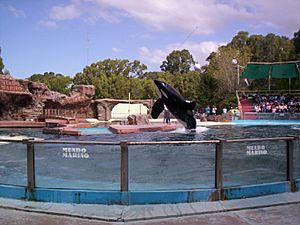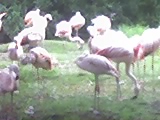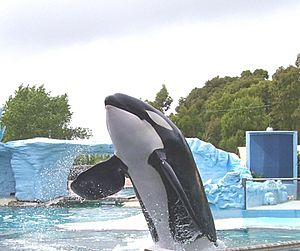Mundo Marino facts for kids
 |
|

Orca show as pictured in 2005
|
|
| Date opened | January 6, 1979 |
|---|---|
| Location | San Clemente del Tuyú, Argentina |
| Coordinates | 36°20′24″S 56°44′49″W / 36.3401°S 56.74696°W |
| No. of animals | 9,000 |
Mundo Marino, which means "Sea World" in Spanish, is the biggest aquarium in Argentina. It's located in a town called San Clemente del Tuyú. This amazing park is home to thousands of animals, including sea mammals, birds, and fish. It's a great place to learn about marine life and enjoy exciting shows!
Contents
History of Mundo Marino
Mundo Marino was started by a man named Juan David Méndez. In the 1960s, he sold his properties in Buenos Aires and moved to San Clemente del Tuyú.
In 1962, Juan David visited the United States. He was very impressed by the large ocean parks there. When he returned to San Clemente, he bought a big piece of land, about 18 hectares (that's like 44 acres!). His first goal was to help sick animals that got stuck on the beaches. He would heal them and then release them back into the ocean when they were healthy again.
The aquarium was built near a special area where many crabs lived, right by the San Clemente stream. Mundo Marino welcomed its first dolphin in 1977. The park first opened its doors to visitors in the summer of 1977-1978.
Today, Mundo Marino has more than 20 pools. It is home to over 50 sea mammals, more than 80 types of birds, and many different kinds of fish and other coastal animals.
What to See and Do
Mundo Marino has many fun and educational attractions for visitors of all ages. Here are some of the highlights:
Orca Show
Get ready to be amazed by the Show de Orca! Here, you can watch the trainers work with killer whales, like Kshamenk. They show how these intelligent animals can understand and communicate through games, rewards, and even by copying their trainers.
Sea Lion Bay
At Bahía de Lobos, you can buy fish and feed the friendly sea lions. It's a fantastic chance to get up close and learn more about their lives and where they live in the wild.
Sea Lion Show
Don't miss the Show de Lobos Marinos! This is a funny comedy show called "Hotel Cinco Estrellas" (Five-Star Hotel). Sea lions, elephant seals, and other marine animals pretend to be guests and staff at an imaginary hotel. It's full of laughs!
Lake Amphitheater
The Anfiteatro del Lago hosts a new show called Pirate Island. It's an exciting adventure where news of a shipwreck and hidden treasure gets everyone in Puerto Cayman excited. They go on a treasure hunt, competing against a pirate ship led by Captain Barracuda.
Image Show
Enjoy the Imagen Show, a multi-vision experience called "Legacy of Nature." It's shown on a huge 18-meter screen. You'll learn about the scientific research, care, and feeding of the marine wildlife at Mundo Marino.
Sea Stadium
At the Estadio del Mar, you can watch Dolphins show off their amazing skills. They compete in fun ways to entertain and thrill everyone watching.
Surprise Theater
The Teatro Sorpresa presents "Los Canta cuentos de Pinguy y Orky." Pinguy and Orky, along with their friends Albatross, Medusa, and a messenger dove, perform children's stories, songs, and dances.
Underwater Encounter
Experience the Encuentro Submarino! This is a special area where you can view the dolphins through a giant window. It's like being underwater with them!
Park Train Ride
Take a relaxing ride on the "La Tronchita" train, the Tren de Paseo. It will take you all around the park, letting you see different areas.
Paradise Lake
Lago Paraíso is a beautiful area with a natural lake and waterfall. You can see many different birds, fish, and colorful flowers here.
Penguin Shelter
The Albergue de Pingüinos is a special place for Emperor penguins. These penguins sometimes come ashore when they are sick or injured. At the shelter, they are rescued, cleaned, and helped to get better. Guides will explain the important work done by the Centro de Rescate y Rehabilitación Provincial (Provincial Rescue and Rehabilitation Center).
Mundo Marino's Orca: Kshamenk
Kshamenk, also known as Sharmenk or Shamenk, is a male killer whale (orca) who lives at Mundo Marino. Experts believe he was about 4 years old when he was captured in 1992. Since 2000, Kshamenk has been the only orca at Mundo Marino. The park's female killer whale, Belén, passed away that year.
Mundo Marino says they rescued Kshamenk after he got stuck on the beach. They decided to keep him because they believed he couldn't go back to the wild safely. There have been discussions about how he came to be at the park, as laws in Argentina protect wild marine animals.
A park in California, Six Flags Marine World, once tried to bring Kshamenk to their park. They wanted him to be a companion for their female orca, Shouka. However, Mundo Marino does not actually own Kshamenk. He is legally held in trust for the people of Argentina. This means Mundo Marino cannot sell him. Also, Argentine law does not allow the export of live native wildlife, including orcas.
Kshamenk became a father for the first time on February 14, 2013. A killer whale named Kasatka, from SeaWorld San Diego, gave birth to a healthy baby boy named Makani. Then, on December 6, 2013, Kshamenk became a father again! Kasatka's daughter, Takara, who lives at SeaWorld San Antonio, gave birth to a healthy baby girl named Kamea. Both of these calves were conceived through a special process called artificial insemination.
See also
 In Spanish: Mundo Marino para niños
In Spanish: Mundo Marino para niños
 | May Edward Chinn |
 | Rebecca Cole |
 | Alexa Canady |
 | Dorothy Lavinia Brown |



